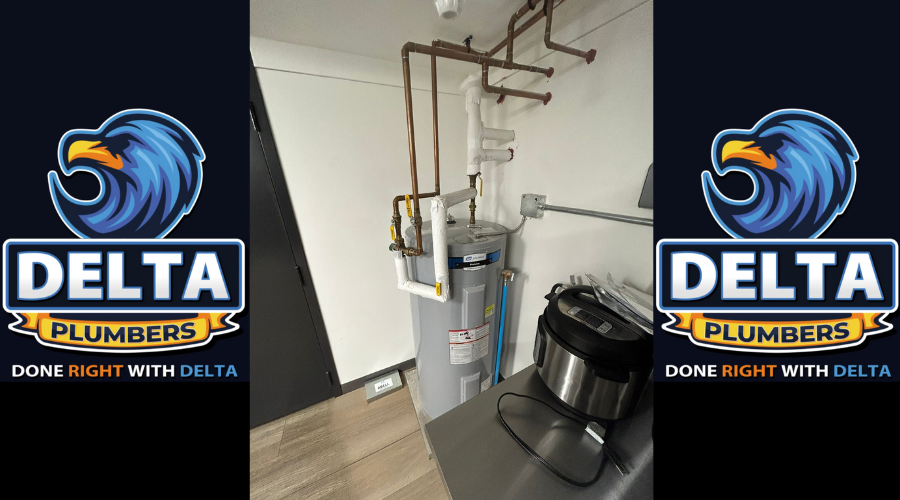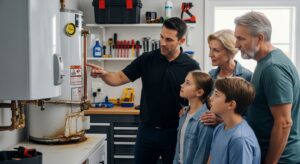Commercial buildings face unique challenges when it comes to plumbing systems. The sheer size and complexity of these systems, along with heavy usage, make plumbing problems in these buildings inevitable. Whether it’s a clogged drain, a leaking pipe, or an inefficient water heater, these plumbing issues can disrupt daily operations and lead to costly repairs if not addressed quickly. In this comprehensive guide, we will explore the top plumbing problems commonly found in commercial buildings and the solutions to resolve them efficiently. We’ll cover everything from diagnosing problems to preventing future issues, using active voice to ensure clarity and effectiveness.

Picture Source – Delta Plumbers
How Do You Solve Plumbing Problems?
Plumbing issues in commercial buildings can be daunting, but the key to solving them lies in prompt action, proper diagnosis, and utilizing professional expertise. Here’s how to approach plumbing problems:
1. Diagnose the Issue:
The first step to solving any plumbing issue is understanding the problem. Whether you are dealing with a leak, clog, or low water pressure, identifying the source is critical. Plumbers use advanced tools, such as video inspection cameras, to assess the condition of pipes and identify blockages or leaks.
2. Shut Off Water Supply:
For most plumbing problems, particularly leaks, it is essential to shut off the water supply to prevent further damage. In commercial buildings, this often involves locating and operating the main water shut-off valve.
3. Consult a Professional Plumber:
While some minor issues can be handled with basic tools, complex problems require professional intervention. Trained plumbers will have the necessary experience, equipment, and knowledge to address everything from pipe corrosion to broken fixtures.
4. Repair or Replace Pipes:
Depending on the severity of the issue, the plumber may suggest repairing or replacing pipes. In cases of significant damage, complete pipe replacement might be necessary to restore the plumbing system to optimal condition.
5. Preventative Measures:
Once repairs are completed, regular maintenance should be scheduled to avoid future problems. Regular inspections and proper maintenance will ensure that your plumbing system remains in top condition.
Also Read: Fix a Running Toilet: A Complete Guide

Picture Source – Delta Plumbers
What Are the Common Plumbing Problems?
Commercial buildings face a range of plumbing problems that require professional attention. Below are the most common issues encountered and how to tackle them:
1. Clogged Drains and Toilets
Clogged drains are one of the most frequent plumbing problems in commercial buildings. These blockages can occur in sinks, toilets, or floor drains and can disrupt business operations. Clogs are usually caused by the accumulation of debris, grease, food particles, or even paper towels in the system.
Solution: Professional plumbers use drain cleaning equipment, including snaking tools and hydro-jetting, to clear blockages effectively. Regular maintenance, such as routine drain cleaning, can help prevent future clogs.
2. Leaking Pipes
Leaking pipes can cause water damage and mold growth, leading to structural damage. In older commercial buildings, corrosion can cause pipes to weaken, leading to leaks.
Solution: Plumbers will identify the source of the leak and replace or repair the damaged pipes. In some cases, applying pipe insulation or using trenchless technology to replace old pipes may be necessary.
3. Low Water Pressure
Low water pressure is another common problem in commercial buildings, especially in multi-story structures. It can affect everything from faucets to showers, causing inconvenience to employees and customers.
Solution: Plumbers will inspect the water pressure regulator, identify leaks, and clean out clogged aerators. If necessary, the plumber may suggest upgrading the water pressure system to better accommodate the building’s water demand.
4. Water Heater Failure
A broken water heater is a major inconvenience, especially in businesses that require hot water for day-to-day operations, such as restaurants, hotels, and medical facilities. Common causes of water heater failure include sediment buildup, faulty heating elements, or old age.
Solution: Depending on the cause, a plumber may suggest flushing the tank, replacing heating elements, or installing a new water heater altogether. Regular maintenance, such as flushing the tank annually, can extend the life of a water heater.
5. Burst Pipes
Frozen pipes, particularly during the winter, can cause significant water damage in commercial buildings. A burst pipe can flood areas of the building and result in costly repairs.
Solution: When pipes burst, the first step is to shut off the water supply and assess the damage. A plumber will need to replace the damaged section of the pipe and check the rest of the system for leaks.
Also Read: Role of Plumbing in Home Renovations

Picture Source – Delta Plumbers
What Is One of the Most Common Problems with Pipes?
One of the most common problems with pipes in commercial buildings is corrosion. Over time, pipes, especially older ones made of galvanized steel or cast iron, can corrode due to constant water flow, high humidity, and the natural wear and tear of materials. Corroded pipes can leak, rupture, or cause low water pressure, leading to expensive repairs and disruptions.
Solution: Regular pipe inspections are essential for early detection of corrosion. In some cases, plumbers may recommend replacing corroded pipes with more durable materials like PVC or copper to prevent future issues.
Also Read: The Benefits of Using Eco-Friendly Plumbing Products

Picture Source – Delta Plumbers
How Do You Diagnose Plumbing Problems?
Diagnosing plumbing problems in a commercial building requires a keen understanding of plumbing systems and specialized equipment. Here are the steps to diagnose plumbing issues effectively:
1. Visual Inspection:
Inspecting visible parts of the plumbing system, including faucets, drains, and exposed pipes, can provide clues about the issue.
2. Listening for Sounds:
Strange sounds, such as gurgling in drains or running water, can indicate underlying issues like clogs or leaks.
3. Pressure Tests:
Plumbers may conduct water pressure tests to determine if low water pressure is due to pipe blockages or leaks.
4. Camera Inspections:
Advanced plumbing diagnostic tools, such as video inspection cameras, are often used to identify hidden issues, such as pipe cracks, corrosion, or root intrusion in underground pipes.
5. Check for Water Damage:
Water stains on walls or ceilings can indicate hidden leaks, and must be addressed immediately.
6. Flow Monitoring:
Monitoring water flow rates can reveal whether there are blockages or inadequate water flow in the system.
Also Read: Prevent Plumbing Issues During Cold Weather: A Complete Guide

Picture Source – Delta Plumbers
How Do You Control Water Flow in Pipes?
Controlling water flow in pipes is crucial for maintaining a healthy plumbing system. The water flow can be adjusted or regulated in various ways:
1. Water Pressure Regulators:
These devices are installed to control and maintain consistent water pressure throughout the system. They ensure that water pressure doesn’t become too high or low, which can cause damage to pipes and fixtures.
2. Shut-off Valves:
Local shut-off valves can be installed on individual fixtures and appliances, allowing you to control the water flow to specific areas without affecting the entire building.
3. Flow Restrictors:
In some cases, installing flow restrictors or aerators can help control water flow, ensuring efficient water use without wasting it.
4. Regular Maintenance:
Ensuring that pipes are free from clogs and leaks allows water to flow smoothly through the system. Regular maintenance helps keep the water flow at optimal levels.
Also Read: Plumbing Codes and Regulations: Understanding Everything

Picture Source – Delta Plumbers
How Do Plumbers Fix Clogged Pipes?
Clogged pipes are one of the most common plumbing issues in commercial buildings. When pipes become clogged with grease, debris, food, or paper products, they can cause slow drainage, foul odors, and water backup. To clear clogged pipes, plumbers will use a variety of methods depending on the severity of the blockage:
1. Snaking:
A plumber uses a plumbing snake or auger to break up the clog and restore flow to the pipe.
2. Hydro-Jetting:
For more stubborn clogs, plumbers may use hydro-jetting, a high-pressure water technique, to clean the pipes thoroughly.
3. Enzyme Cleaners:
For minor clogs caused by organic materials, plumbers may use enzyme-based cleaners to break down blockages naturally without harming the pipes.
4. Pipe Replacement:
In extreme cases where the pipe is beyond repair, the plumber may recommend replacing the affected section of the pipe.
Also Read: How to Install a Garbage Disposal

Picture Source – Delta Plumbers
What Is the Most Common Cause of Pipe Failure?
The most common cause of pipe failure in commercial buildings is corrosion. Over time, exposure to water, minerals, and chemicals can cause pipes to corrode, weaken, and eventually fail. Corrosion is particularly problematic in older buildings with metal pipes, such as galvanized steel or cast iron.
Solution: To prevent corrosion, commercial building owners should regularly inspect pipes, particularly in older systems. Replacing aging pipes with more durable materials, like copper or PVC, is a long-term solution to prevent corrosion-related failures. Additionally, installing water treatment systems can help prevent mineral buildup that accelerates pipe corrosion.
Conclusion
Plumbing problems in commercial buildings are inevitable but manageable with timely intervention and preventive measures. Understanding common issues like clogged drains, leaks, and water heater failure, and knowing how to diagnose and fix these problems, is essential for maintaining a smooth operation. Commercial plumbing systems require ongoing maintenance and regular inspections to avoid costly repairs and downtime. By following the outlined solutions and consulting professional plumbers, building owners can keep their plumbing systems functioning efficiently and avoid major plumbing disasters. Regular checks, timely repairs, and smart water flow management will ensure that plumbing systems remain in top shape for years to come.









